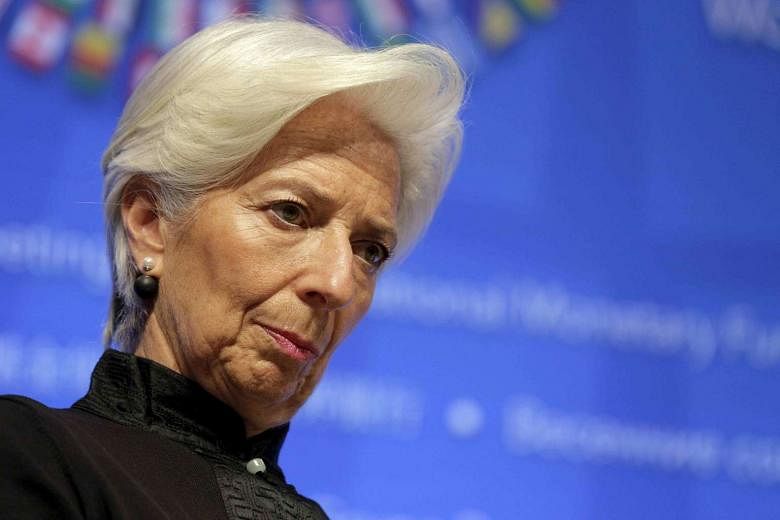WASHINGTON/PARIS (AFP) - Five years ago Christine Lagarde burst through the glass ceiling at one of the world's leading institutions, becoming the first woman to head the International Monetary Fund.
Her ascension to the prestigious post marked the culmination of a meteoric rise for the French lawyer and former government minister, who began a second term as managing director of the IMF in July.
But her stellar career may have hit a snag.
On Friday, France's highest appeals court ruled she should stand trial over a massive state payout to tycoon Bernard Tapie in 2008 when she was the country's economy minister.
Lagarde is accused of negligence for ordering that a long-running legal row between the state and Tapie be resolved by arbitrators, instead of in court, and then failing to challenge his colossal 404-million-euro (S$604 million) award.
The trailblazing 60-year-old says she has a "clear conscience."
"I've always acted in accordance with the law, and I've always had in mind the public interest," she told AFP in an interview in Washington earlier this month.
Her legal woes have done little to dent her popularity in France, where her name has long been bandied about as a possible contender for president.
She herself has ruled herself out of the running.
"I think I'm better suited to what I'm doing today than for the world of politics," she told AFP.
A high-profile trial would be a blow to the unflappable finance czar, who patiently worked to restore the IMF's lustre after the sex scandal that brought down her predecessor and fellow compatriot Dominique Strauss-Kahn in 2011.
The IMF move gave her a seat inside the closed, male-dominated circle of world leaders, but also landed her with responsibility for handling Greece's debt crisis.
Less than a year after her arrival, the initial rescue plan for Greece crumbled and the IMF was forced to join an expanded second bailout operation, taking the cost to a massive 240 billion euros.
Greece kept bleeding, and now has a third bailout.
IMF has refused to contribute to the latest rescue plan until Greece comes up with a plan to slash its massive debt pile.
A tough negotiator, Lagarde, accusing her successor as French economy minister, Pierre Moscovici, of being asleep during one crisis meeting.
"There are many instances of Ms Lagarde's courageous truth-telling," said economist Desmond Lachman, a former IMF official.
At the same time, she skillfully managed the shifting currents of power in the Fund, where emerging giants like China are challenging the Europe-US-dominated status quo.
Lagarde recently scored two major successes at the IMF: the addition of the Chinese yuan to the Fund's basket of reserve currencies and the passage by the US Congress of long-stalled IMF reforms, for which she had joked she would "do belly-dancing" if needed to get US ratification.
The silver-haired mother of two sons has fashioned herself as an icon to talented women fighting male dominance in large organisations like the IMF.
Born in Paris to teacher parents, she was brought up in the port city of Le Havre.
As a teenager she was a synchronised swimming champion and learned to speak nearly flawless English.
After earning a law degree, she skipped a French establishment career and instead joined the Paris office of prestigious US legal consulting giant Baker & McKenzie.
She worked her way up to become chairwoman of the company's global executive committee in 1999, a first for the firm, and then of its global strategy committee in 2004.
She then embraced politics, joining the centre-right government of president Jacques Chirac as trade minister in June 2005.
Chirac's successor Nicolas Sarkozy appointed her to the finance portfolio in 2007, making her the first woman named to the post which she held until 2011.
Though not a trained economist, she proved deft at dealing with the financial crisis that at one pointed threatened the eurozone's unity.
In an interview with American public radio, she recalled how she was told by a major French law firm at the outset of her career there was no way to break through the glass ceiling.
"'You can join us tomorrow and be an associate, be given great tasks and great files and great clients to work on, but don't ever expect to make partnership.'
"And I said, 'Why would that be?' They said, 'Because you're a woman.'"
"And I just left...," she said.

